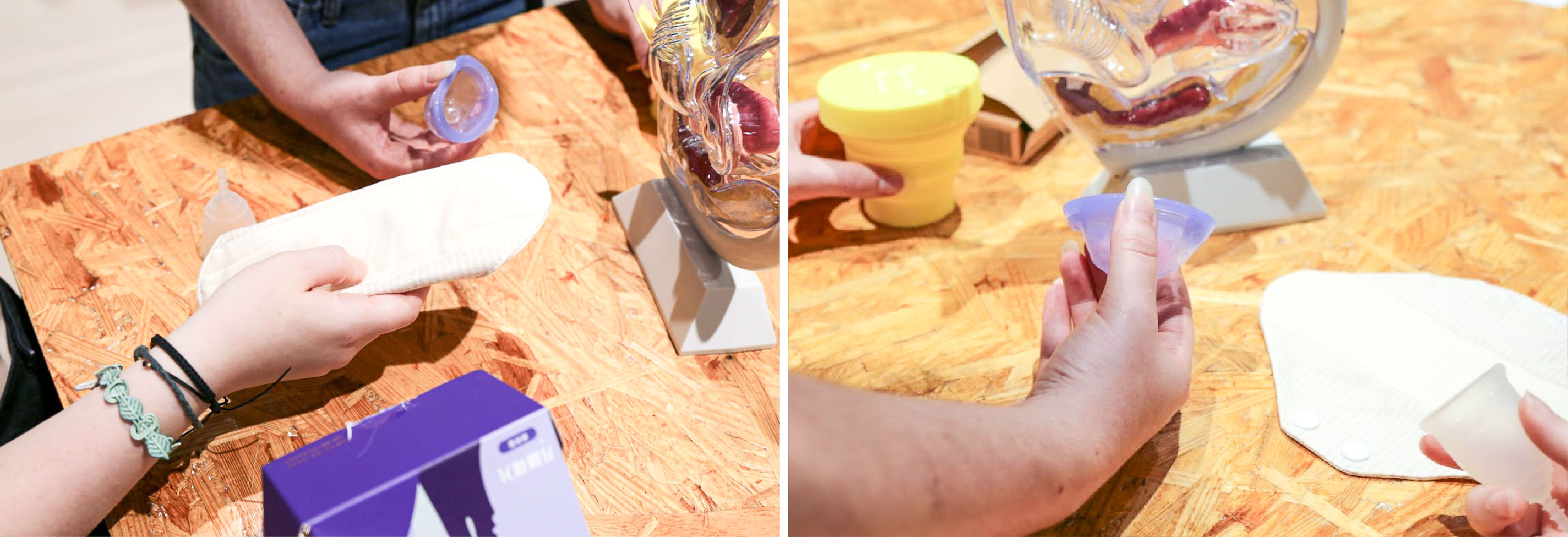During the March-May 2022 COVID-19 lockdown in Shanghai, food, medicine, and other essentials were sometimes difficult to obtain. But there was another necessity that went overlooked: period care products. After realizing this specific challenge within the NYU Shanghai community and throughout China, Undergraduate Coordinator of Interactive Media Arts (IMA) Marcela Godoy and Visual Arts and Humanities Professor Monika Lin were inspired to create the Sustainable Menstrual Care Initiative.
The project aims to educate the NYU Shanghai community about more eco-friendly choices for period care through workshops for students, faculty, and staff. Awarded a Green Grant from NYU’s Office of Sustainability, the initiative allows Godoy and Lin to provide free reusable menstrual products to community members at their workshops.
Most people who menstruate will have a monthly period for about 40 years, and will typically use traditional period care products, such as single-use pads and tampons, during their period, which can last anywhere from a few days to sometimes over a week. According to the American Medical Association, the average menstruating person will use over 15,000 pads or tampons in their lifetime.
Pads and tampons, which are usually made with or wrapped in plastic, contribute significantly to landfill waste. The Sustainable Menstrual Care Initiative aims to spread awareness of reusable, eco-friendly options, such as menstrual cups, menstrual discs, cloth pads, and period underwear.
While these options do exist, they are not well-known or widely available in physical stores yet. “[Sustainable products] are not something that is convenient for the market [to provide], said Godoy. “It’s much more [profitable] for them to sell single-use products because you return and buy more.” Because they are typically sold online rather than in-store, many people don’t even know to look for these sustainable options.

Associate Arts Professor of Interactive Media Arts (IMA) Marcela Godoy leading a workshop.
The Sustainable Menstrual Care Initiative spreads awareness via small, interactive group workshops, which consist of sessions for students, facilitated by student leaders of the club Green Shanghai, and separate sessions for faculty and staff, which are led by Professors Godoy and Lin, along with New Student Programs Coordinator Qianni Zhu. In the workshops, participants can share their feelings about and experiences with menstruation, learn more about sustainable products and how to use them, and exchange resources and advice.
The workshops have become more than an educational resource for the community–they have started conversations about larger social issues, as well. “We wanted to start discussion about all these problems that we face related to not only the products, but also menstruation in general, gender inclusion, accessibility, the facilities we have now on campus, and the shame that is associated with [these topics],” shared Godoy, who added that that menstruation not only affects women, but also transgender and non-binary individuals.
Workshop participants have also discussed gender in relation to providing access to sustainable period products in campus restroom facilities. Because gender neutral and wheelchair-accessible bathrooms on campus are typically single-stall bathrooms with their own sinks, they may be better suited for the use of menstrual cups and discs, which need to be emptied and washed between uses.

Sustainable menstrual products options include reusable pads, cups and disks.
“[The initiative] started with sustainable period products and the access to these products, but I think it also touches on a lot of bigger societal aspects, like the pink tax [and] accessibility to products,” added Zhu, referring to to the tendency for products marketed towards women, such as period products, to be more expensive than products marketed towards men.
In some countries, including many US states, there even exists a “tampon tax”–a sales tax on period care products, while other medically necessary products are exempt. These two types of taxes can make purchasing period products less accessible for low-income individuals. Also impacting accessibility is product design: for example, some brands of period underwear may not offer plus-size options, or options that are gender-affirming for trans and non-binary people. Due to the taboo nature of menstruation, people tend not to discuss these issues openly, which only allows them to further persist.
Though the Sustainable Menstrual Care initiative is relatively new, with its first workshop occurring in the Spring 2023 semester, the project has already begun to make an impact in the NYU Shanghai community.
Lan Zhang ’25 said she felt the workshop offered a safe space for participants to share experiences and thoughts freely. “I want to know and try more options about menstruation supplies,” said Zhang “It is not a well-discussed topic in China, [so] there’s not many ways for us to learn and try.” Starting on October 13, reusable pads and period underwear will be available at the Health and Wellness Center.
Moving forward, Lin and Godoy hope to expand awareness of the initiative, so that more people can learn about and try sustainable menstrual products. “We hope to continue to collaborate with Health and Wellness, Student Life, Green Shanghai, and other groups. [We want] to create [more] awareness of reusable menstrual products [and] issues surrounding menstruation in general, provide spaces for open dialogue and knowledge sharing, forward the need for redesigning bathroom facilities to make reusable products more convenient [...], and most importantly, provide these reusable products on campus to all menstruators,” said Lin.


